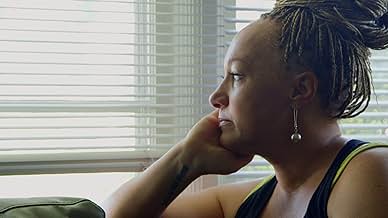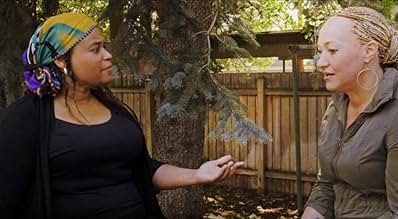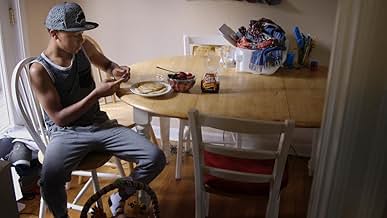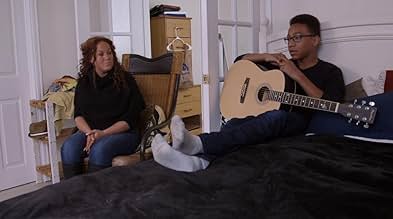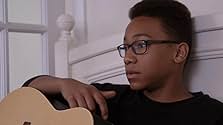IMDb RATING
6.3/10
2.8K
YOUR RATING
Rachel Dolezal becomes a social phenomenon when she passes herself off as an African American and becomes the head of her local N.A.A.C.P. chapter.Rachel Dolezal becomes a social phenomenon when she passes herself off as an African American and becomes the head of her local N.A.A.C.P. chapter.Rachel Dolezal becomes a social phenomenon when she passes herself off as an African American and becomes the head of her local N.A.A.C.P. chapter.
- Director
- Writers
- Stars
- Awards
- 1 nomination total
Vanessa Bayer
- Self
- (archive footage)
Tamar Braxton
- Self
- (archive footage)
- Director
- Writers
- All cast & crew
- Production, box office & more at IMDbPro
Featured reviews
It was interesting to see the back story of someone who would go this far to disassociate themselves from reality. But in a way you can see that she's not fallen as far from the tree as she imagines, the white savior like her parents, adopting black children, just in a different way, fueled by religious fervor of a moral crusade.
Her artistic skill is surprisingly good, its a shame she wasted it to become part of the diversity and grievance industry. But that's the thing this film reveals, she can barely fix her own life let alone anyone elses, a single mother, divorced, saddled with many children, while divorced has another child against the fathers wishes while she has no job. Is she trying to live an ugly stereotype and bring it to life?
The doc does fail to really delve deeper into what she got herself into, the vast infrastructure of the diversity industry. How this nobody became a NAACP branch president, where did they get their money, how was she teaching courses in colleges? The vast flows of money to create these human networks of diversity propagandists is something a netflix doc is never going to deal with, and that's too bad, because it destroys lives, not just Rachels, but those it indoctrinates with the poison of a history and identity of grievance. She might have been a decent artist, maybe even a history teacher, if she had not tried to be what she was not and had spent her time on herself rather than trying to be the white savior.
When she joined the game of identity politics she learned the lesson that the content of her character meant nothing. That is the lesson of her life, and this film.
Poor thing is addicted to persecution and keeps seeking it out. I feel really bad for her black teenage sons who she keeps dragging through it.
This documentary is well done and shows many sides of the saga of Rachel Dolezol. The saddest part of this story is how much her children suffer and because of her delusions and narsissm she cannot relate to what they are going through. She cares more about how she feels. Mental help for her and her boys would be very helpful. I liked seeing the perspectives of black folks who were apalled by her appropriation of black culture. I think her background tells us a lot about why she became who she is today. However, it was disturbing and focused on her book so much I wish it was shorter.
While Rachel's story is interesting and raises many valid questions about race and identity, the viewer doesn't actually learn much about these topics. As a staple of Netflix documentaries, The Rachel Divide includes virtually no expert opinions or historical background or even contextual information - I would've loved to hear what actual scholars and researchers of race or identity think about this issue! - all we get is Rachel sharing her feelings and long scenes of her doing chores or talking to her family. And then of course a bunch of clips of people angrily reacting to the whole issue.
I think it's a massive missed opportunity and although the ending desperately wants to ask the viewer "well what do you think?" there is almost nothing to base our opinions on.
I think it's a massive missed opportunity and although the ending desperately wants to ask the viewer "well what do you think?" there is almost nothing to base our opinions on.
I'm from Belgium, so I never really experienced the scandal as Americans did. I can vaguely remember that it even made the newspapers here. I must have read this article years ago. When I opened Netflix I recognized Rachel. So I started watching.
This documentary was actually better than I thought it would be. The main focus is clearly on Rachel herself, and how this scandal affects her children, family and in general her whole social life. From the beginning you get the straight feeling that this story is not an easy one to tell. There is no black and white (get it!? ;-) ), with a big lie in between. This is obviously a woman who has been struggling with her identity for many years. You do start to feel she cannot be categorized as a liar. That would just be to simple. I think Rachel does believe that she never really lied. Perhaps she was just really creative with the "truth", so she could continue being the person she loved the most. But when you ignore a certain part of you, it will come back to bite you. That's exactly what happened. Towards the end you do feel Rachel is pushing it. Her family is clearly crumbling, and trying to get away from her. I got the feeling she did see this happening, but just couldn't help herself. Her son was actually quite spot on: "You can't tell my mom what to do". Clearly frustrated. This kid just wishing for life getting back to normal. She's like a dog being hit with a stick and coming back for more. All this for acceptance she will never get.
Being an European I do watch at identity a bit different than most Americans do. And I do feel this woman was born a few decades to early. Whether you like it or not, we've gone from a world to a little village in a few decades. Soon there will be no more "race". So identifying yourself with a certain culture will be a social choice. In that way I think the black community, understandably very hurt about the struggle they already had, made a big mistake here. Instead of demonizing this woman, they could have joined this idea. Making acceptance a universal thing. Not just related to the way you look and your skin color. Isn't this what they have been fighting for? Not being judged on the way you look, but who you are? Equal opportunities? Doesn't that go for a person, who is white but feels black? Or maybe it is just all very black and white. Who am I to say!?
This documentary was actually better than I thought it would be. The main focus is clearly on Rachel herself, and how this scandal affects her children, family and in general her whole social life. From the beginning you get the straight feeling that this story is not an easy one to tell. There is no black and white (get it!? ;-) ), with a big lie in between. This is obviously a woman who has been struggling with her identity for many years. You do start to feel she cannot be categorized as a liar. That would just be to simple. I think Rachel does believe that she never really lied. Perhaps she was just really creative with the "truth", so she could continue being the person she loved the most. But when you ignore a certain part of you, it will come back to bite you. That's exactly what happened. Towards the end you do feel Rachel is pushing it. Her family is clearly crumbling, and trying to get away from her. I got the feeling she did see this happening, but just couldn't help herself. Her son was actually quite spot on: "You can't tell my mom what to do". Clearly frustrated. This kid just wishing for life getting back to normal. She's like a dog being hit with a stick and coming back for more. All this for acceptance she will never get.
Being an European I do watch at identity a bit different than most Americans do. And I do feel this woman was born a few decades to early. Whether you like it or not, we've gone from a world to a little village in a few decades. Soon there will be no more "race". So identifying yourself with a certain culture will be a social choice. In that way I think the black community, understandably very hurt about the struggle they already had, made a big mistake here. Instead of demonizing this woman, they could have joined this idea. Making acceptance a universal thing. Not just related to the way you look and your skin color. Isn't this what they have been fighting for? Not being judged on the way you look, but who you are? Equal opportunities? Doesn't that go for a person, who is white but feels black? Or maybe it is just all very black and white. Who am I to say!?
Did you know
- Quotes
Franklin: All my mom did is say she was black and people just lost their minds
- How long is The Rachel Divide?Powered by Alexa
Details
- Release date
- Country of origin
- Language
- Also known as
- 黑白瑞秋
- See more company credits at IMDbPro
- Runtime1 hour 40 minutes
- Color
- Aspect ratio
- 1.85 : 1
Contribute to this page
Suggest an edit or add missing content



